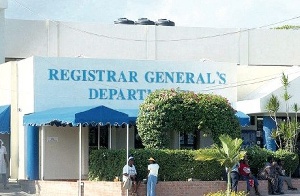The Registrar-General’s Department is to delete the names of all dormant companies on its register beginning April 2019, as part of a large-scale cleaning-up of its database.
All businesses that have not filed their annual returns for more than a decade and are not on the e-register are expected to be deleted from the register.
“There are over one million businesses on my database that have not filed their annual returns. They just register for one-time, maybe for a visa or contract, and they do not bother to come back.
“It looks like you have a database of companies and half of them are not doing any serious business in Ghana, so we are trimming it down to know those that are really doing business,” she said at the Ghana Association of Restructuring and Insolvency Advisors’ (GARIA) end of year cocktail reception at the Marriot Hotel, Accra.
She added that the department’s e-register, which was introduced almost 10 years ago, now has more than 500,000 registered companies; and she is urging all businesses that are yet to re-register to do so before April 2019 to avoid paying steep penalties and sanctions.
“This electronic system keeps track of all businesses in Ghana, and if you are not updated into that system it means you have not been filing your annual returns, which is a mandatory requirement, and we cannot at the touch of a button have information on you,” she said.
To be updated, she explained, a business or company’s officers must have unique tax identification numbers, auditors have a tax identification number, shareholders have tax identification numbers; and annual returns must come with financial statements, and then the business will be issued with new certificates and documentation.
“The idea is to winnow and strike out all businesses that are not doing serious business in Ghana, so we have a viable, credible and accurate database of businesses in Ghana that people can really trust and do business with,” she said.
New Companies’ Law
Mrs. Oware noted that when Parliament passes the new Companies’ Act, early next year, the Registrar of Companies will be hived off the department to become an autonomous institution, and that will give more power to company inspectors to maintain a credible, detailed and accurate register of companies.
Mrs. Oware added that many businesses do not have a register of members, register of directors, register for meetings – and the new law will allow the new institution to implement tenets of the Companies Act and ensure that companies comply with them.
“There are a lot of sanctions and penalties. People will just have to be serious. You cannot just come to my office and use your driver as your secretary. This is to ensure that you know what you are about. If you do not want to register a company, then do not do it; but if you want to register a company, you must comply with the Companies Act,” she added.
Insolvency Law
Felix Addo, President of GARIA, speaking on the theme ‘Toward Enhancing the Ease of Doing Business: The Journey So Far in Reforming the Companies and Corporate Insolvency Bills’, noted that the new Insolvency bill will be passed in the first half of next year to improve the ease of doing business in the country.
“There are about 10 or 11 key indicators which help attract businesses to a country. Among them is having predictable enforcement of contract laws, ease of registering a company; having land issues streamlined is important; the ease with which you resolve distressed or insolvency situations, and the degree to which our courts resolve contract disputes is also critical,” he said.
He said the organisation has been working on the new Companies Law and Insolvency Law for the past 10 years, but government has assured that these bills – in addition to others such as the Public Private Partnership bill, Land Registration bill, Identification bill, will be passed into law.
Business News of Saturday, 22 December 2018
Source: thebftonline.com
1m dormant businesses to be deleted – Registrar-General
Entertainment
















